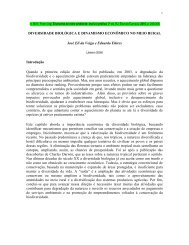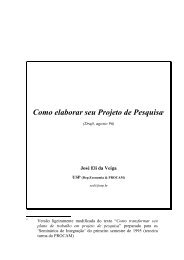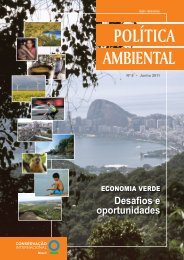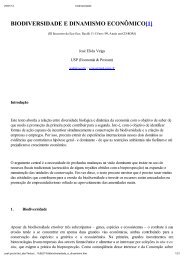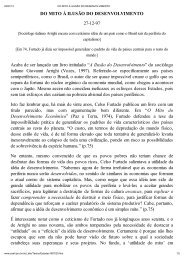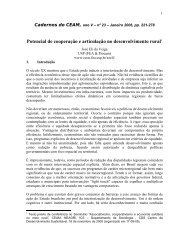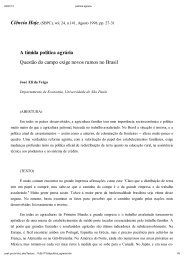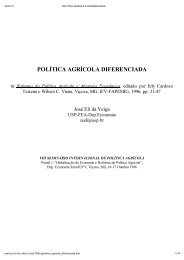sustainable development 20 years on from the ... - José Eli da Veiga
sustainable development 20 years on from the ... - José Eli da Veiga
sustainable development 20 years on from the ... - José Eli da Veiga
You also want an ePaper? Increase the reach of your titles
YUMPU automatically turns print PDFs into web optimized ePapers that Google loves.
30<br />
air (see <strong>the</strong> secti<strong>on</strong> <strong>on</strong> health), and <strong>from</strong> <strong>the</strong> deteriorati<strong>on</strong> or shortage of <strong>the</strong> natural resources or water <strong>on</strong><br />
which <strong>the</strong>y depend for <strong>the</strong>ir survival. The poor are also more vulnerable to extreme wea<strong>the</strong>r events, which<br />
tend to worsen with climate change.<br />
Not enough has been invested in <strong>the</strong> past few decades in managing <strong>the</strong> risks associated with<br />
natural events, and post-disaster recovery or rec<strong>on</strong>structi<strong>on</strong> has often been postp<strong>on</strong>ed or left incomplete<br />
(ECLAC, <str<strong>on</strong>g>20</str<strong>on</strong>g>10b). The need to a<strong>da</strong>pt to <strong>the</strong> c<strong>on</strong>sequences of climate change makes <strong>the</strong> role of<br />
envir<strong>on</strong>ment protecti<strong>on</strong> and ecosystem services even more important. Where potential c<strong>on</strong>flicts of access<br />
and c<strong>on</strong>trol exist in relati<strong>on</strong> to envir<strong>on</strong>mental resources, States must make additi<strong>on</strong>al efforts to ensure that<br />
<strong>the</strong> rights of disadvantages groups are properly protected (UNCRD, <str<strong>on</strong>g>20</str<strong>on</strong>g>11). 3<br />
Inequality, too, has many dimensi<strong>on</strong>s (UNDP, <str<strong>on</strong>g>20</str<strong>on</strong>g>10a). One of <strong>the</strong>m is gender. Women have made<br />
a major c<strong>on</strong>tributi<strong>on</strong> to poverty reducti<strong>on</strong> through paid and unpaid work and migrant remittances<br />
(ECLAC, <str<strong>on</strong>g>20</str<strong>on</strong>g>10b). Poverty is worse, however, in female-headed households and in most of <strong>the</strong> countries<br />
of <strong>the</strong> regi<strong>on</strong> a higher proporti<strong>on</strong> of female-headed households than male-headed households are poor.<br />
Women outnumber men in <strong>the</strong> regi<strong>on</strong>’s informal labour markets and c<strong>on</strong>sequently earn lower incomes<br />
and have more limited social security access (UNDP, <str<strong>on</strong>g>20</str<strong>on</strong>g>10a). The countries with <strong>the</strong> greatest inequalities<br />
in general also show <strong>the</strong> largest gaps between men and women. What is more, given <strong>the</strong> double work<br />
burden (paid and unpaid) borne by women and <strong>the</strong> higher barriers <strong>the</strong>y face to working outside <strong>the</strong> home,<br />
<strong>the</strong>y have narrower opti<strong>on</strong>s for overcoming poverty and entering paid employment (UNDP, <str<strong>on</strong>g>20</str<strong>on</strong>g>10a,<br />
<str<strong>on</strong>g>20</str<strong>on</strong>g>10b). Inequality also has a str<strong>on</strong>gly territorial comp<strong>on</strong>ent: Latin America as a regi<strong>on</strong> shows highly<br />
uneven patterns of land use (see secti<strong>on</strong> D).<br />
The sustainability perspective must necessarily c<strong>on</strong>sider <strong>the</strong> intergenerati<strong>on</strong>al transmissi<strong>on</strong> of<br />
inequality (UNDP, <str<strong>on</strong>g>20</str<strong>on</strong>g>10a and ECLAC, <str<strong>on</strong>g>20</str<strong>on</strong>g>10a). Two critical factors in this respect are unequal<br />
capacities and high rates of early fertility am<strong>on</strong>g <strong>the</strong> poorest populati<strong>on</strong> groups (for a discussi<strong>on</strong> of <strong>the</strong><br />
latter, see secti<strong>on</strong> 5).<br />
With regard to capacity-building, <strong>the</strong> quality of educati<strong>on</strong> remains highly uneven between<br />
different socioec<strong>on</strong>omic levels and between <strong>the</strong> rural and urban populati<strong>on</strong>s in <strong>the</strong> countries of Latin<br />
America and <strong>the</strong> Caribbean (see figure I.6). Five criteria are used to assess <strong>the</strong> quality of educati<strong>on</strong>:<br />
importance of learning, relevance, equity, effectiveness and efficiency. Even though <strong>the</strong> regi<strong>on</strong> has<br />
made significant strides in educati<strong>on</strong> compared with <strong>the</strong> internati<strong>on</strong>al c<strong>on</strong>text, inequalities persist<br />
between and above all within <strong>the</strong> countries of <strong>the</strong> regi<strong>on</strong>. At <strong>the</strong> end of <strong>the</strong> first decade of <strong>the</strong> twentyfirst<br />
century, 91% of Latin Americans and Caribbean nati<strong>on</strong>als were literate and 94% of school-age<br />
girls and boys were enrolled in a school programme (UNESCO, <str<strong>on</strong>g>20</str<strong>on</strong>g>11). Generally speaking, reading<br />
skills and above all skills in ma<strong>the</strong>matics and <strong>the</strong> sciences are below <strong>the</strong> average for <strong>the</strong> OECD<br />
countries. According to <strong>the</strong> sec<strong>on</strong>d Regi<strong>on</strong>al Comparative and Explanatory Study of <strong>the</strong> United Nati<strong>on</strong>s<br />
Educati<strong>on</strong>al, Scientific and Cultural Organizati<strong>on</strong> (UNESCO), Cuba is <strong>the</strong> country in <strong>the</strong> regi<strong>on</strong> with<br />
<strong>the</strong> best performance in all areas (UNESCO, <str<strong>on</strong>g>20</str<strong>on</strong>g>11).<br />
3<br />
In August <str<strong>on</strong>g>20</str<strong>on</strong>g>11, <strong>the</strong> intermediate Governments of Latin America, led by <strong>the</strong> Latin American Organizati<strong>on</strong> of<br />
Intermediate Governments (OLAGI) and with support <strong>from</strong> <strong>the</strong> United Nati<strong>on</strong>s Centre for Regi<strong>on</strong>al<br />
Development (UNCRD), signed <strong>the</strong> Valparaíso Manifesto <strong>on</strong> Human Security in <strong>the</strong> Latin America Integrati<strong>on</strong><br />
Agen<strong>da</strong>, with emphasis <strong>on</strong> climate change and risk management. This Agen<strong>da</strong> will be submitted at <strong>the</strong> United<br />
Nati<strong>on</strong>s C<strong>on</strong>ference <strong>on</strong> Sustainable Development (Rio+<str<strong>on</strong>g>20</str<strong>on</strong>g>). There are also significant initiatives under way in<br />
Chile, Colombia, Haiti and H<strong>on</strong>duras, which point up <strong>the</strong> outcomes of synergies between human security,<br />
biological diversity and territorial (rural and urban) management in a c<strong>on</strong>text of integrated land management.



